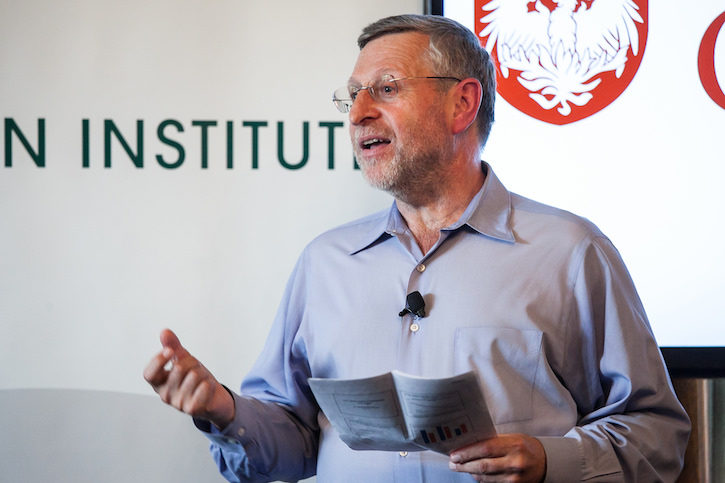
After the bilateral summit at Mar-a-Lago between Presidents Donald Trump and Xi Jinping, China-expert David Dollar of the Brookings Institution sat down with the Paulson Institute to share his quick reaction to the summit and thoughts on the road ahead for U.S.-China ties. Excerpts:
Given what we saw coming out of the Mar-a-Lago summit, what do you think the chances are that the U.S. Administration will still implement extreme anti-China trade measures?
During the campaign, candidate Trump threatened some pretty harsh measures toward China, naming it a currency manipulator or saying he would impose a 45% import tariff. What we saw at Mar-a-Lago was a friendlier discussion. President Trump referred to his relationship with President Xi as “outstanding,” they have set up an economic dialogue—very similar to what Hank Paulson originally set up—called the “Comprehensive Economic Dialogue,” headed by Treasury and Commerce. So the indication is that the U.S. administration will be, in some real sense, continuing a policy of engaging with China on economic issues. I think in the economic realm, the administration has moved away from the harsh rhetoric. The problem with a harsh policy like a 45% import tariff is that it would hurt the U.S. economy. We’ve got complicated value chains—a lot of U.S. firms are involved in value chains that have significant operations in China. So if you impose a tariff on Chinese products, you hurt some U.S. firms. And also, that kind of import protection tends to ultimately reduce our exports—that’s because import protection makes our partners poorer, tends to appreciate our exchange rate, and usually invites retaliation. I don’t think a high tariff would likely be good for the U.S. economy or bring back manufacturing jobs. So they seem to have moved away from that in favor of trying to negotiate something of a better relationship.
Another point of contention has been Chinese investment in the United States, especially in technology sectors. There is increasing sentiment in Congress and among the public that Chinese investment often poses some sort of security risk. Would these types of investments bring value to the U.S. economy?
The U.S. economy is very open to foreign investment of different types. We do have a process for looking at the national security implications of mergers and acquisitions. That has been used to stop a couple of Chinese transactions, but in general we are very open. And so we are the number one destination for China’s overseas investment, which is now becoming quite massive. We are open because we typically think that investment has benefits, and I think that that’s largely true. It creates jobs and higher productivity. That said, I am a little bit worried—you have got Chinese state enterprises buying up their competitors in the United States. Those state enterprises operate behind protected walls in China. They are not really globally efficient companies. I am not sure we get the same kind of benefit out of those kinds of investments, so I think that’s worth looking at.
Some people believe that the Trump administration has not yet fully developed a strategic policy toward China. Do you see China taking advantage of that on the global economic stage?
China is certainly emerging as a superpower, regardless of what the United States does. Given that reality, it’s inevitable there is going to be some tension in the U.S. about what is the best strategy. My basic reaction to the current state of the U.S.-China economic relationship is that the U.S. is playing small ball, while China is swinging for the fences. China has big initiatives, including AIIB and One Belt One Road, and is investing huge amounts of money around the world. In our relations with China, we seem focused on a lot of small issues, such as opening the beef market and U.S. investment bank ownership in China. The U.S. has a lot of legitimate economic issues with China, but there are bigger things happening in the world, and it can be a mistake for the U.S. to get really focused on negotiating those relatively small things.
At the same time, China doesn’t seem to be using its global initiatives to undermine the existing world order. China seems to be a status-quo power that is supportive of existing global economic institutions. It is interesting that as the Trump administration considers withdrawing from the world, Xi Jinping was quick to step up at Davos and elsewhere and become the champion of free trade. Nonetheless, this is a little bit disingenuous because China still has a lot of restrictions on imports into China.


